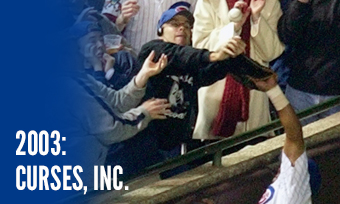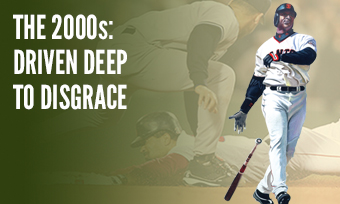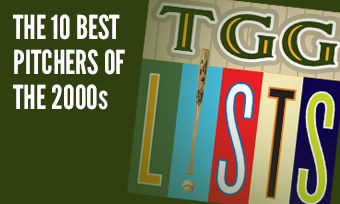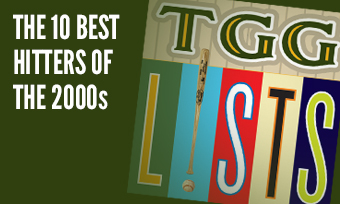The Yearly Reader
Leaders and Honors, 2003
Our list of baseball’s top 10 hitters and pitchers in both the American League and National League for the 2003 baseball season, as well as the awards and honors given to the game’s top achievers of the year.
The National League’s Top 10 Hitters, 2003
Bold type in brick red indicates league leader.
1. Albert Pujols, St. Louis
Key Numbers: .359 average, 137 runs, 212 hits, 51 doubles, 43 home runs, 124 RBIs, 10 hit-by-pitches.
Pujols earned $900,000, the highest salary earned to date by a third-year player; it wasn’t enough. He edged out Todd Helton for the only batting title of his career, and amassed a 30-game hit streak that’s tied for the second-longest in Redbirds history.
2. Barry Bonds, San Francisco
Key Numbers: 130 games, .341 average, 111 runs, 45 home runs, 90 RBIs, 148 walks, 61 intentional walks, 10 hit-by-pitches, .529 on-base percentage, .749 slugging percentage.
A bittersweet year for Bonds; he became the first player with at least 500 home runs and stolen bases each—no one else had yet made it to 400/400—and tied Duke Snider’s NL record with 59 straight games reaching base safely at least once, but also grieved over the death of his father, former major leaguer Bobby Bonds.
3. Todd Helton, Colorado
Key Numbers: .358 average, 135 runs, 209 hits, 49 doubles, 5 triples, 33 home runs, 117 RBIs, 111 walks, 21 intentional walks.
Hitting .389 from the Fourth of July on, Helton was walked intentionally in his final plate appearance of the season—when a hit would have given him his second batting title in four years.
4. Gary Sheffield, Atlanta
Key Numbers: .330 average, 126 runs, 190 hits, 37 doubles, 39 home runs, 132 RBIs, 18 stolen bases.
After spending a moody existence with the Dodgers, Sheffield found “peace of mind” and revitalized numbers in his second—and last—year with the Braves.
5. Jim Thome, Philadelphia
Key Numbers: .266 average, 111 runs, 30 doubles, 47 home runs, 131 RBIs, 111 walks, 182 strikeouts.
The former Indian and first-year Phillie helped bid adieu to aging Veterans Stadium by mashing more home runs (28) through one season than anyone else; it was the only time that the Hall of Fame-bound slugger led a league in round-trippers.
6. Javy Lopez, Atlanta
Key Numbers: 129 games, .328 average, 89 runs, 29 doubles, 43 home runs, 109 RBIs.
The veteran Braves catcher, shedding 30 pounds to bounce back from a .233 average and 11 home runs the year before, clobbered the most homers of six Braves players with at least 20; not bad for a guy who didn’t even have enough plate appearances to qualify for the batting title.
7. Richie Sexson, Milwaukee
Key Numbers: 162 games, .272 average, 97 runs, 165 hits, 28 doubles, 45 home runs, 124 RBIs, 98 walks.
Matching his career mark in home runs from 2001, Sexson was particularly sharp when playing the Diamondbacks (whom he collected nine of his blasts against, over 77 at-bats) to convince them to grab him after the season for six players.
8. Jim Edmonds, St. Louis
Key Numbers: 137 games, .275 average, 89 runs, 32 doubles, 39 home runs, 89 RBIs.
Edmonds’ season hit peak in late June by hitting 16 homers over a 29-game stretch—then hit .226 with 12 dingers over the final three months with injuries playing a role.
9. Edgar Renteria, St. Louis
Key Numbers: .330 average, 96 runs, 194 hits, 47 doubles, 13 home runs, 100 RBIs, 34 stolen bases, 21 grounded into double plays.
The 27-year-old Colombian channeled the Cardinals of Whitey Herzog’s days and stole 34 bases while knocking in 100 runs on little power; the rest of team collectively swiped only 48 bags.
10. Luis Gonzalez, Arizona
Key Numbers: .304 average, 92 runs, 176 hits, 46 doubles, 26 home runs, 104 RBIs, 94 walks.
As the Diamondbacks continued to slip under the weight of heavy payroll and age, the 35-year-old Gonzalez maintained a strong grip on the stat sheet.
The American League’s Top 10 Hitters, 2003
1. Carlos Delgado, Toronto
Key Numbers: .302 average, 117 runs, 172 hits, 38 doubles, 42 home runs, 145 RBIs, 109 walks, 23 intentional walks, 19 hit-by-pitches.
Delgado’s four-homer performance in the season’s fourth-to-last game guaranteed him over 40 for the third and last time, while also pushing his average over .300 for only the second time.
2. Alex Rodriguez, Texas
Key Numbers: .298 average, 124 runs, 181 hits, 30 doubles, 6 triples, 47 home runs, 118 RBIs, 87 walks, 15 hit-by-pitches, 17 stolen bases, .600 slugging percentage.
As the rumor mill surrounding A-Rod’s future in Texas soon pumped up to max volume, he won his lone MVP in three years with the Rangers in a tight vote that saw 10 different players receive first-place votes.
3. Manny Ramirez, Boston
Key Numbers: .325 average, 117 runs, 185 hits, 36 doubles, 37 home runs, 104 RBIs, 97 walks, 28 intentional walks, 22 grounded into double plays, .427 on-base percentage.
Ramirez just missed out on his second straight batting title, trailing by a single point to teammate Bill Mueller—but his relations with fans, teammates and coaches began to fray with his increased habit of sitting out games and pinch-hit appearances under dubious circumstances.
4. Carlos Beltran, Kansas City
Key Numbers: .307 average, 102 runs, 14 doubles, 10 triples, 26 home runs, 100 RBIs, 41 stolen bases, 4 caught stealing.
Beltran continued to fly under the baseball radar—which was easy to do at the time in Kansas City, even as the typical terrible Royals suddenly spiked in the standings with a decent 83-79 record.
5. Bret Boone, Seattle
Key Numbers: .294 average, 111 runs, 183 hits, 35 doubles, 5 triples, 35 home runs, 117 RBIs, 16 stolen bases.
Boone knocked in 100-plus runs for the third straight year; the other three Boones (grandfather Ray, father Bob and brother Aaron) combined for two 100-RBI campaigns.
6. Vernon Wells, Toronto
Key Numbers: .317 average, 678 at-bats, 118 runs, 215 hits, 49 doubles, 5 triples, 33 home runs, 117 RBIs, 17 hit-by-pitches, 16 stolen bases.
Wells, said to seldom speak a dirty word, complemented Carlos Delgado in the Blue Jays lineup with a gosh darn good year.
7. Nomar Garciaparra, Boston
Key Numbers: .301 average, 120 runs, 198 hits, 37 doubles, 13 triples, 28 home runs, 105 RBIs, 11 hit-by-pitches, 19 stolen bases.
Garciaparra’s fantastic reign in Boston was coming to an end, not helped by strained relations with reporters and the front office (which was low-balling him on an extension); he would be traded to the NL midway through 2004 and never found his groove back.
8. David Ortiz, Boston
Key Numbers: 128 games, .288 average, 79 runs, 39 doubles, 31 home runs, 101 RBIs.
While Garciaparra was ready to depart, Big Papi made a big splash in his first year at Boston following six ho-hum years with the Twins; 27 of his 31 home runs came after July 2.
9. Trot Nixon, Boston
Key Numbers: 134 games, .306 average, 81 runs, 24 doubles, 6 triples, 28 home runs, 87 RBIs.
Strong supporting numbers from the Boston right fielder, one of six Red Sox players with 25 or more homers.
10. Jason Giambi, New York
Key Numbers: .250 average, 97 runs, 25 doubles, 41 home runs, 107 RBIs, 129 walks, 140 strikeouts, 21 hit-by-pitches.
Not even the continued use of HGH—a steroid Giambi would admit to using from 2001-03 to the BALCO grand jury—could keep the high-priced star Yankee’s batting averaging from plummeting after four years hitting well above .300. But the power and patience (AL-high walks) were still there.
The National League’s Top 10 Pitchers, 2003
1. Jason Schmidt, San Francisco
Key Numbers: 2.34 ERA, 17 wins, 5 losses, .773 win percentage, 29 starts, 3 shutouts, 207.2 innings, 46 walks, 17 stolen bases allowed, 0 caught stealing/picked off.
Freed from the derelict Pirates a couple of years earlier, the poker-faced Schmidt highlighted an impressive tenure in San Francisco with an ERA crown and a terrific .200 opposing batting average.
2. Kevin Brown, Los Angeles
Key Numbers: 2.39 ERA, 14 wins, 9 losses, 32 starts, 211 innings, 23 grounded into double plays.
Fragile as ever and perhaps hung over from his dip into steroids (to cite the Mitchell Report), Brown pieced together one final, absence-free campaign before a rough two-year coda spent with the Yankees.
3. Mark Prior, Chicago
Key Numbers: 2.43 ERA, 18 wins, 6 losses, .750 win percentage, 30 starts, 211.1 innings, 50 walks, 245 strikeouts.
What could have been: The fireballing Prior racked up both wins and strikeouts at age 22 before sadly racking up one injury after another in the years to follow, leading to a premature exit from the majors in 2006.
4. Eric Gagne, Los Angeles
Key Numbers: 1.20 ERA, 2 wins, 3 losses, 55 saves, 0 blown saves, 77 appearances, 82.1 innings.
The first NL reliever to win a Cy Young Award since 1989, Gagne produced year-round ninth-inning perfection; his only blown save of the year—at the All-Star Game—bruised only his ego, not his team.
5. Billy Wagner, Houston
Key Numbers: 1.78 ERA, 1 win, 4 losses, 44 saves, 3 blown saves, 78 appearances, 86 innings.
Wagner proved to be getting better and better since a terrible injury-wracked 2000, setting career highs in appearances, innings and saves.
6. Livan Hernandez, Montreal
Key Numbers: 2.20 ERA, 15 wins, 10 losses, 33 starts, 8 complete games, 233.1 innings, 10 hit-by-pitches, 21 grounded into double plays.
Living down his horrendous Game Seven start from the 2002 World Series as best he could—but playing before no one in Montreal—the former Giant became a better pitcher simply by not tipping his pitches for opponents to see.
7. Curt Schilling, Arizona
Key Numbers: 2.95 ERA, 8 wins, 9 losses, 24 starts, 168 innings, 34 walks, 194 strikeouts.
Appendicitis and a broken hand diminished the invincibility factor both he and Randy Johnson (also hurt in 2003) had both breathed in Arizona over the previous three years, but he was still sharp when healthy enough to take the mound.
8. Carlos Zambrano, Chicago
Key Numbers: 3.11 ERA, 13 wins, 11 losses, 32 starts, 214 innings, 94 walks, 12 intentional walks, 10 hit-by-pitches, 24 grounded into double plays.
Along with Mark Prior, Zambrano served as an awful reminder to opposing hitters that stingy, fireballing Cub pitchers did not begin and end with Kerry Wood.
9. Russ Ortiz, Atlanta
Key Numbers: 3.81 ERA, 21 wins, 7 losses, .750 win percentage, 34 starts, 212.1 innings, 102 walks, 22 stolen bases allowed.
After knocking out the Braves with two NLDS wins in 2002, Ortiz made up by leading the NL in wins for Atlanta.
10. Brandon Webb, Arizona
Key Numbers: 2.84 ERA, 10 wins, 9 losses, 26 starts, 186.2 innings, 40 walks, 10 stolen bases allowed, 17 caught stealing/picked off, 20 grounded into double plays.
Using movement to make up for a lack of supreme velocity—his fastball rarely eclipsed 90—the rookie right-hander portended a bright (if far from eternal) future for the Diamondbacks.
The American League’s Top 10 Pitchers, 2003
1. Tim Hudson, Oakland
Key Numbers: 2.70 ERA, 16 wins, 7 losses, .696 win percentage, 34 starts, 2 shutouts, 240 innings, 9 intentional walks, 10 hit-by-pitches, 23 grounded into double plays.
When the weather got hot, so did the tenacious A’s ace—sporting an 9-1 record and 1.38 ERA from the summer solstice to the end of August.
2. Esteban Loaiza, Chicago
Key Numbers: 2.90 ERA, 21 wins, 9 losses, .700 win percentage, 34 starts, 226.1 innings, 207 strikeouts, 10 hit-by-pitches.
The Tijuana-born Loaiza, a common pitcher for eight years, finally earned his ticket to stardom with the addition of a cut fastball and became a surprise leader in strikeouts.
3. Pedro Martinez, Boston
Key Numbers: 2.22 ERA, 14 wins, 4 losses, .778 win percentage, 29 starts, 186.2 innings.
Pedro took down his fifth and final ERA title—and yes, Yankees coach Don Zimmer as well—running his six-year record in Boston to a remarkable 101-28.
4. Roy Halladay, Toronto
Key Numbers: 3.25 ERA, 22 wins, 7 losses, .759 win percentage, 36 starts, 9 complete games, 2 shutouts, 266 innings, 32 walks, 23 stolen bases allowed, 23 grounded into double plays.
Halladay’s first of three seasons topping 20 wins including the first 10-inning shutout thrown by a major leaguer since Jack Morris’ Game Seven performance in the 1991 World Series. The victims: The 43-119 Tigers.
5. Jamie Moyer, Seattle
Key Numbers: 3.27 ERA, 21 wins, 7 losses, .750 win percentage, 33 starts, 215 innings.
Moyer found good company in Cy Young, Pete Alexander, Warren Spahn and Phil Niekro as the only pitchers to win 20 games after age 40.
6. Keith Foulke, Oakland
Key Numbers: 2.08 ERA, 9 wins, 1 loss, 43 saves, 5 blown saves, 72 appearances, 86.2 innings.
Foulke shined as the A’s latest closer de jour, part of a parade of effective relievers who delivered and then quickly left via trade or free agency.
7. Mike Mussina, New York
Key Numbers: 3.40 ERA, 17 wins, 8 losses, .680 win percentage, 31 starts, 214.2 innings, 40 walks.
The veteran ace won his first seven starts of the year to cannonball his way toward another stellar campaign.
8. Barry Zito, Oakland
Key Numbers: 3.30 ERA, 14 wins, 12 losses, 35 starts, 231.2 innings.
Relatively tepid run support from his teammates soured what should have been a finer record.
9. Mariano Rivera, New York
Key Numbers: 1.66 ERA, 5 wins, 2 losses, 40 saves, 6 losses, 64 appearances, 70.2 innings, 10 walks.
Rivera began a stretch that would prove to be the peak of his career, securing his first of eight sub-2.00 ERAs over a nine-year period.
10. Mark Mulder, Oakland
Key Numbers: 3.13 ERA, 15 wins, 9 losses, 26 starts, 9 complete games, 2 shutouts, 186.2 innings, 40 walks, 10 stolen bases .
Mulder’s shot at a second 20-win record was cut short when placed on the shelf with a season-ending hip fracture in mid-August.









